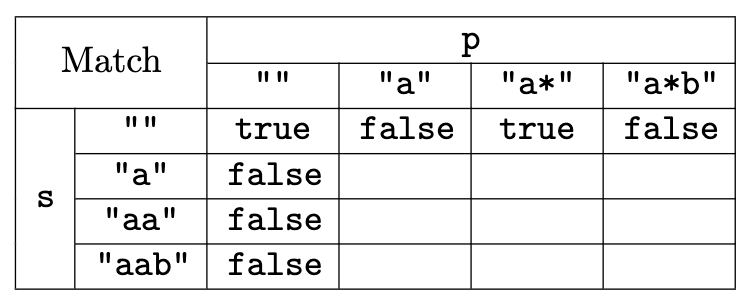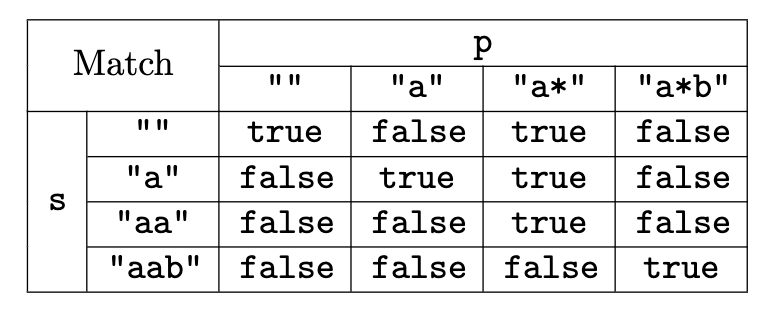Regular Expression Matching
Problem
Given an input string s and a pattern p, implement regular expression matching with support for . and * where:
.Matches any single character.*Matches zero or more of the preceding element.
The matching should cover the entire input string (not partial).
Input: s = "aa", p = "a"
Output: false
Input: s = "aa", p = "a*"
Output: true
Input: s = "ab", p = ".*"
Output: true
Using recursion
The key thing to first note is that the * character is a wildcard that can match zero or more of the preceding character.
This means even when s is empty, it can still match p.
So when do we know whether s and p match?
The base case is when p is empty.
- If
pis empty andsis empty, then they match. - If
pis empty andsis not empty, then they don’t match.
If p is not empty, we need to see if the next pattern is an x*:
x is any character.
p[1] == '*'?
If the next pattern is not an x*, then we just need to see if the current characters match:
Let’s call this isFirstMatch:
isFirstMatch = !s.isEmpty() && s[0] == p[0] || p[0] == '.'
However, if the next pattern is an x*, then we have two additional scenarios to consider:
- The
*matches zero characters, so we skip this pattern (advancepby 2). - The
*matches the current character (isFirstMatch), so we advancesby one character andpstays with the pattern.
Recursive solution
1
2
3
4
5
6
7
8
9
10
11
12
13
14
15
16
17
18
19
20
21
22
23
24
public boolean isMatch(String s, String p) {
// Base case
if (p.isEmpty()) return s.isEmpty();
boolean isFirstMatch;
if (s.isEmpty()) isFirstMatch = false;
else {
Character cs = s.charAt(0);
Character cp = p.charAt(0);
isFirstMatch = cs.equals(cp) || cp.equals('.');
}
// Are we in a '*' pattern?
if (p.length() > 1) {
Character cp2 = p.charAt(1);
if (cp2.equals('*')) {
boolean noMatch = isMatch(s, p.substring(2));
boolean yesMatch = isFirstMatch && isMatch(s.substring(1), p);
return noMatch || yesMatch;
}
}
// Not in a '*' pattern
return isFirstMatch && isMatch(s.substring(1), p.substring(1));
}
This solution is $O(2^n)$.
Using dynamic programming
It is easy to see that in order to check whether s and p match, the previous parts of s and p must match.
Since having a solution for the subproblem helps us solve the bigger problem, we can use dynamic programming.
Let M where M[i][j] is true if s[0:i] and p[0:j] match.
M is s.length() + 1 by p.length() + 1 because we need to account for the empty string.

There are two base cases:
As seen in the recursive solution, if
pis empty, thensmust also be empty for them to match.Hence, only
M[0][0] = truein the first column.If
sis empty, thenpmust be empty or have a*pattern with zero matches.Hence,
M[0][j] = trueifp[j - 1] == '*' && M[i][j - 2].

Then we can fill in the rest of the table by:
- If we are not in a
*pattern, then we can just check if the current characters match (or.) and if the previous parts ofsandpmatch. - If we are in a
*pattern, then we need to check ifsmatches the previous character inpvia*or if it was a zero match case.
DP solution
1
2
3
4
5
6
7
8
9
10
11
12
13
14
15
16
17
18
19
20
21
22
23
24
25
26
27
28
29
30
31
32
33
34
35
36
37
38
39
40
41
42
43
44
45
46
47
48
public static boolean isMatch(String s, String p) {
int n = s.length();
int m = p.length();
// Additional row and column for empty string
boolean[][] M = new boolean[n + 1][m + 1];
// Rest of the first column is already false
M[0][0] = true;
// Base case for when s is empty
for (int j = 1; j < m + 1; j++) {
Character pc = p.charAt(j - 1);
M[0][j] = pc.equals('*') && M[0][j - 2];
}
for (int i = 1; i < n + 1; i++) {
// Current character of s
Character sc = s.charAt(i - 1);
for (int j = 1; j < m + 1; j++) {
// Current character of p
Character pc = p.charAt(j - 1);
boolean isFirstMatch;
// Are we in a '*' pattern?
if (pc.equals('*')) {
// Previous character of p
Character pcp = p.charAt(j - 2);
// Current character of s matches previous character of p
isFirstMatch = sc.equals(pcp) || pcp.equals('.');
// Zero match, pretend it doesn't exist
// As long as the previous parts before '*' pattern matches we're good
boolean noMatch = M[i][j - 2];
// There was a match, so check if this wildcard match was valid previously
boolean yesMatch = isFirstMatch && M[i - 1][j];
M[i][j] = noMatch || yesMatch;
} else {
// Not in a '*' pattern
// Check if current characters match and previous parts match
isFirstMatch = sc.equals(pc) || pc.equals('.');
M[i][j] = isFirstMatch && M[i - 1][j - 1];
}
}
}
return M[n][m];
}
This solution is $O(nm)$.